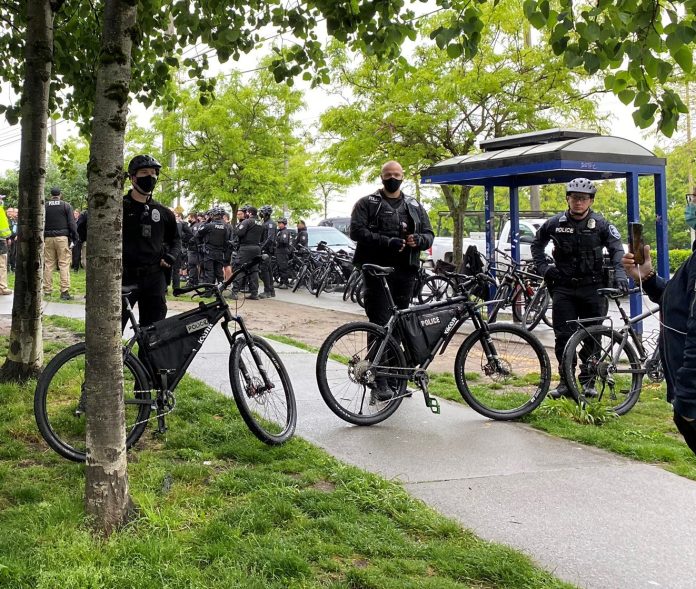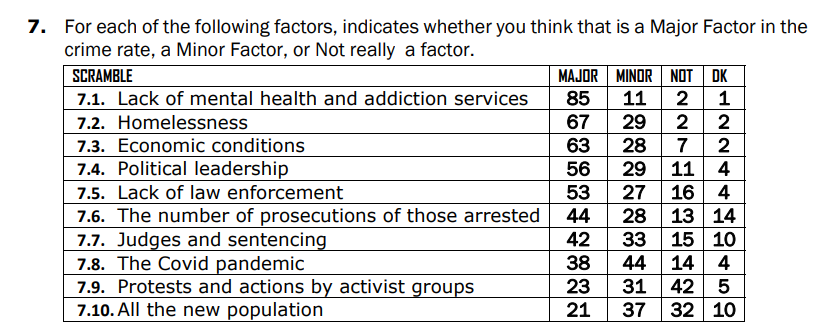
Councilmember Sara Nelson was on the warpath during the Seattle City Council’s weekly briefing Monday, seeking to outmaneuver Public Safety Chair Lisa Herbold to force though $4.5 million in police hiring bonuses. Both lawmakers insisted the other had been bending the rules and breaking decorum. Ultimately, Councilmember Andrew Lewis, who was acting as council president in Debora Juarez’s absence, invited them to resume their debate Tuesday afternoon at the full council meeting rather than derail the briefing.
Councilmember Herbold will be seeking to add her bill adding $650,000 to cover moving expenses for new hires and a new full-time recruiter position to the referral agenda, but Nelson was squarely against such a procedure, arguing “walking the bill on” in Juarez’s absence was a “disrespect to the council president.” She also claimed it was a rushed timeline against good governance guidelines, but Herbold countered that one week lead time was sufficient.
Update: On Tuesday, the city council voted 5 to 2 to add Councilmember Herbold’s bill to the public safety committee agenda for May 10th, with Nelson and Alex Pedersen voting no. In comments ahead of the vote, Nelson continued to insist Herbold was violating the rules, rushing the bill, and “profoundly disrespectful” of Council President Juarez. For her part, Herbold continued to argue this agenda addition was a normal application of the rules, not a circumvention of them. She suggested if Nelson wanted to make the standard to never amend the calendar without the Council President’s vote, she should propose such a rule change. Lewis noted Herbold already previewed her concept at her April 26th public safety committee meeting and received news coverage, which makes it hardly a surprise piece of legislation.
Public safety committee typically meets Tuesday morning right before full council in the afternoon. Under Nelson’s strict interpretation of the rules, legislation from public safety committee would require an additional week of lead time to reach full council, while other committees only need a week and change. Herbold argued that was unfair and overly restrictive.
The two councilmembers also butted heads at public safety committee last week when midway though the meeting Nelson tried to walk on her bill with $4.5 million in hiring and retention bonuses for the Seattle Police Department (SPD). Herbold declined to add the bill to the agenda, saying she hadn’t had a chance to review it yet. Nelson said the chair had unfairly blocked her, and told her colleagues that she would try to bring her resolution through her own economic development committee.
Nelson also suggested she wanted to first pass her resolution and then at a later meeting her bill lifting the proviso and allocating the incentive money. However, she may elect to speed up her timetable if she wants to race Herbold’s bill. Nelson claimed to have the backing of Mayor Bruce Harrell, Deputy Mayor Monisha Harrell, and interim Police Chief Adrian Diaz in her approach to staffing incentives. According to spokesperson Jamie Housen, Mayor Bruce Harrell has not endorsed Nelson’s ordinance, but did offer general support to incentives as part of a comprehensive recruitment strategy.
“My understanding is that both of the Councilmember’s conversations with Mayor Harrell and the Senior Deputy Mayor occurred before this ordinance was even contemplated,” Housen said in an email. “Councilmember Nelson informed the mayor of her plan to sponsor a resolution in support of staffing bonuses, generally. The mayor let her know she was welcome to put it forward and that doing so would not create an issue with the Mayor’s Office.”
It does not appear Senior Deputy Mayor Harrell has specifically endorsed Nelson’s bill either.
“Similarly, when Councilmember Nelson asked to discuss police recruiting with Senior Deputy Mayor Harrell, the Senior Deputy Mayor encouraged her to explore potential solutions to SPD staffing challenges from the legislative level, which might include incentive pay or relocation costs as potential options,” Housen said.
Overall, it appears the Mayor’s policy preference is to use “more specifically targeted incentives.”
“We are grateful Councilmembers Herbold and Nelson are looking at options to fund incentives to hire more officers,” Housed added. “The mayor would support authority from the Council to include incentives as part of his comprehensive recruitment strategy, including more specifically targeted incentives like a relocation bonus and education benefits.”
The hiring bonuses approach has one serious drawback, however, in that it hasn’t been demonstrated to increase recruitment. After Council rejected a police hiring and retention incentive proposal from Councilmember Alex Pedersen, Mayor Jenny Durkan forced though $25,000 in hiring bonuses for lateral hires last year via emergency executive order, but the effort failed to correlate with an uptick in recruitment of sworn officers. This could be because many cities were offering similar incentives and much of the country is experiencing a shortage of officers. A City report admitted the results of Durkan’s incentive program were inconclusive and advised broader changes to overhaul the City’s job classification system and provide more promotion opportunities rather than relying on one-time incentives.
Given the questionable track record of success, this could make a huge police staffing incentive program like Nelson is proposing a costly investment to make, especially when the City faces a budget deficit estimated at $150 million. The Mayor has asked all city departments to prepare budget cuts ranging from 3% to 6%. Sparing SPD from the general regime of budget discipline would make the other department cuts even deeper.
The City admitted it’s not on pace to recruit 125 officers like it aimed to do in last year’s budget, with trend lines pointing toward fewer than 100. SPD has also not yet succeeded in staunching its attrition rate to the extent optimistically projected in the budget, which means the department continues to lose more officers than it’s recruiting. Thus, even with a hiring incentive program, the City should not count on a police staffing surge to solve its public safety woes. Expanding non-police responses, such as mental health services and youth violence prevention programs, is better suited to meet the moment, as former Seattle Mayor Mike McGinn reiterated on a recent episode of Crystal Fincher’s Hacks and Wonks podcast.
Poll shows support for more social service spending
As it happens, a Crosscut-Elway poll focused on public safety also came out Monday showing public safety is a top concern for Seattle voters, but police aren’t the only response that Seattleites want to see. Voters expressed even stronger preference for non-police responses, while a majority also supported increasing staffing at SPD.
“When asked where they think the city should direct its resources to deal with crime, 92% of respondents said funding for more addiction and mental health services,” Crosscut‘s Josh Cohen reported. “Eighty-one percent want to see more de-escalation training for police officers, 80% want more social programs to address crime’s root causes, 75% want to add more nonpolice staffing, and 73% want to see an increase in court staffing to process the caseload.” Meanwhile, 64% of respondents supported hiring more police officers, while 28% wanted to cut spending on police officers.

Additionally, the lack of law enforcement was identified as a major factor in the crime rate by 53% of respondents, which was well behind the lack of mental health and addiction services at 85%, homelessness at 67%, and economic conditions at 63%. The “Crosscut Elway” poll of 400 Seattle voters was conducted by McGuire Research between April 20 and 25, with a stated 5% margin of error.
The results suggest that Seattleites want to invest in solutions that tackle the root causes of crime and homelessness, in addition to hiring more police officers. So far, Seattle’s incoming elected leaders have focused attention and proposed allocations on the police staffing question, while non-police responses and services seeking to address root causes are getting considerably less attention, despite the even stronger public support.
First glimpse at Mayor Harrell’s approval rate
The poll also offers the first glimpse at job approval numbers for Mayor Harrell, albeit with a poorly worded question that seemed to apologize for its own existence. The pollster asked: “New Mayor Bruce Harrell has been in office for only about three months, so it is early to say, but are you encouraged or discouraged by what you have seen so far from Mayor Harrell?” In response, 40% said encouraged, 19% said discouraged, and 41% didn’t have an opinion.
It would have been cleaner to have a simple approve or disapprove of job performance question with no hemming and hawing about if it’s too early to pass judgment on a mayor who promised he was ready to hit the ground running and act decisively starting on day one. Even worded as it was, most of Seattle appears to be on the fence about whether the Mayor is getting the city on track and delivering on the bold promises he made heading into office. Making the right investments to reduce the crime rate and homelessness could ultimately be the deciding factor.
Doug Trumm is publisher of The Urbanist. An Urbanist writer since 2015, he dreams of pedestrian streets, bus lanes, and a mass-timber building spree to end our housing crisis. He graduated from the Evans School of Public Policy and Governance at the University of Washington in 2019. He lives in Seattle's Fremont neighborhood and loves to explore the city by foot and by bike.

